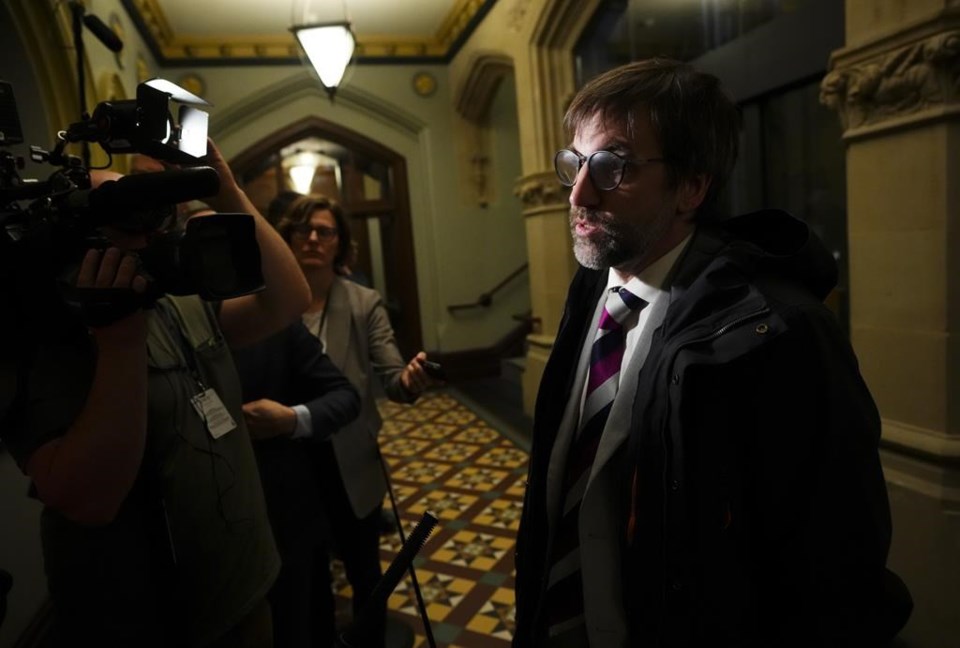REGINA — Saskatchewan’s justice minister again defended the province’s inability to meet incoming electricity regulations after the federal environment minister accused Premier Scott Moe of making “irresponsible” comments.
Bronwyn Eyre said on Wednesday Steven Guilbeault is “misguided” on how the clean electricity standards will affect utility rates in the province after Guilbeault said it’s “baseless and untrue” for Moe to say bills would spike dramatically.
“This is not about getting the word out or spinning our wheels here, this is about pointing out the cold hard facts of the matter,” Eyre said in an interview.
“And it would be very helpful if Minister Guilbeault could respond with cold hard facts about how we’re supposed to get to net zero and no fossil fuel-generated electrical power by 2035.”
Moe said this week Saskatchewan may not follow the incoming clean electricity standards, arguing Ottawa’s plan to require net-zero electrical grids by 2035 would cause bills to triple or quadruple.
The premier also said such regulations would “leave us freezing in the dark.”
Guilbeault responded on Wednesday by suggesting Moe is overblowing the situation.
He said Ottawa’s clean electricity standards focus on ensuring the system can deliver power in a way that’s affordable and reliable.
“Promoting fear about the impact on rates is irresponsible, especially given that the regulations haven’t even been developed,” he said in a statement. “Creating a cleaner electricity grid is about creating cleaner air and making sure homes and businesses have access to affordable power.”
The standards are currently under development but would require electrical generation to be net zero by 2035, with conventional coal being phased out by 2030.
The standards would allow natural gas plants to continue operating after 2035 if they abate emissions by capturing carbon or co-firing with non-emitting fuels.
Natural gas could also be used to provide backup energy or in emergency situations.
However, Eyre noted equipping current natural gas plants with carbon capture technology would be extremely costly, especially within the next 12 years.
She said the president of SaskPower, the Crown utility responsible for electricity, has told the federal government that going to net zero by 2035 is not “technologically, logistically or financially feasible.”
“The president said the technology required for such a radical transition does not exist or has not been proven at a commercial scale,” Eyre said. “People have to get their heads around this. And the federal government has to stop suggesting that these are trial balloons or pie-in-the-sky talking points.”
SaskPower’s grid includes wind and solar energy, but it predominantly uses natural gas and coal to produce electricity. Saskatchewan doesn’t have much hydro capacity.
The utility has long argued it needs a source of baseload power, like natural gas or nuclear, to provide stable energy. It has said it can meet net-zero requirements by 2050.
However, Guilbeault said technology has advanced “to the point where clean electricity projects are becoming cost competitive with fossil fuel alternatives.”
“It’s about creating quality long-term jobs within a stronger economy, while cutting the pollution causing climate change,” he said. “The bottom line is our government is eager to work with Saskatchewan on creating a grid, that will support jobs and keep energy rates affordable for the long term.”
The federal minister said Ottawa is making a 15 per cent tax credit available to companies, like SaskPower, to spend on non-emitting electricity generation.
SaskPower is also to receive a return of hundreds of millions of dollars that it had paid in carbon taxes to the federal government. These dollars can be used on clean energy projects.
However, Eyre said the funds and the tax credit have “strings attached” that would require Saskatchewan to sign on to being net zero by 2035.
She said the province isn’t willing to do that just yet.
“You can adhere to some abstract, impossible standard that's being imposed on us from above, or you can help the people in the province and we're going to choose the latter right now,” she said.
Eyre said the province is considering using the Saskatchewan First Act on the clean electricity standards, as well as on other federal environmental policies.
She said a tribunal is expected to study the regulations and figure out how much it would cost the province.
When asked if this will result in another legal challenge, Eyre responded, “We’ll have to see what the tribunal finds in terms of the dollar figure.”
She argued Saskatchewan constitutionally has jurisdiction over the operation of electrical generation facilities, including the source of fuel those facilities use.
The province lost its case against the federal government over the carbon tax, but Eyre said the decision from that case may not apply to other policies.
“Nowhere in that decision did it say that the federal government could continue to use its ultimate trump card – peace, order and good government – on every set of regulations that they decided to impose on provinces," she said. "And I would submit clean electricity would be right up there."
This report by The Canadian Press was first published May 3, 2023.
Jeremy Simes, The Canadian Press



